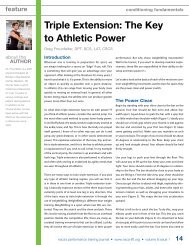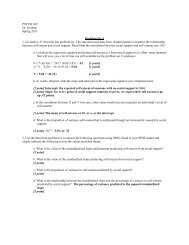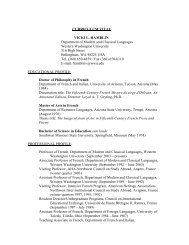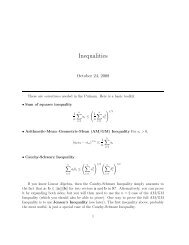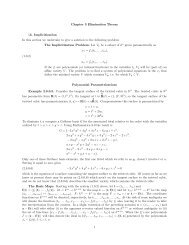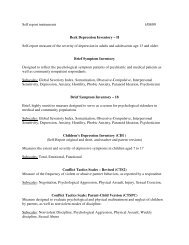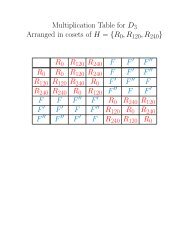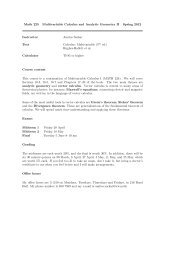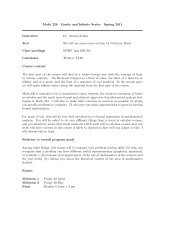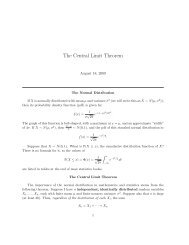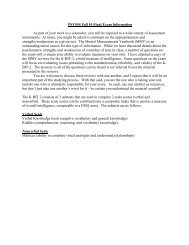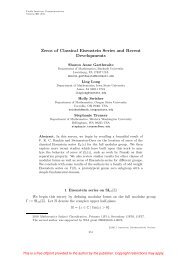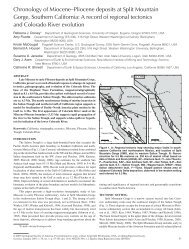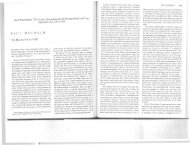Can There Be A Knowledge-First Ethics of Belief? - Western ...
Can There Be A Knowledge-First Ethics of Belief? - Western ...
Can There Be A Knowledge-First Ethics of Belief? - Western ...
You also want an ePaper? Increase the reach of your titles
YUMPU automatically turns print PDFs into web optimized ePapers that Google loves.
which case the theory entails that nobody should ever believe them. And<br />
that is a mistake, because sometimes we should believe necessary falsehoods.<br />
For instance, if the entire mathematical community tells us, for several hundred<br />
years, that a certain very complicated mathematical claim is true, then<br />
we should believe that claim - even if that claim, for some subtle reason,<br />
turns out to be false (and hence necessarily false). 21<br />
Once again, we need to look elsewhere if we are going to find an adequate<br />
knowledge-first ethics <strong>of</strong> belief. Since the appeal to evidence didn’t work out,<br />
it is natural to turn to the other notion most popular in standard contemporary<br />
theorizing about the ethics <strong>of</strong> belief, namely the notion <strong>of</strong> a beliefforming<br />
process. 22 Reliabilists theorize about the ethics <strong>of</strong> belief in terms<br />
<strong>of</strong> reliable belief forming processes. From a knowledge-first perspective, it<br />
makes sense to replace appeals to the notion <strong>of</strong> a belief-forming process with<br />
appeals to the notion <strong>of</strong> a knowledge-producing process. A theory built on<br />
this notion could say, perhaps, that we should believe whatever it is that<br />
knowledge-producing processes would have us believe. Since “trusting what<br />
mathematicians have been saying for hundreds <strong>of</strong> years” is a knowledgeproducing<br />
process, this approach may be able to circumvent the problems<br />
with necessary falsehoods that refute even the best <strong>of</strong> our evidence-centered<br />
knowledge-first theories.<br />
Of course this theory won’t work as stated; it has numerous problems. For<br />
one thing, it has the standard “conditional fallacy” problems for theories<br />
involving counterfactuals. For another thing, it gives us very few details<br />
about the notion <strong>of</strong> a knowledge-producing process. It would be nice to get<br />
some details about (for instance) whether knowledge-producing processes<br />
generate knowledge whenever they are used, or some <strong>of</strong> the times they are<br />
used, or most <strong>of</strong> the times they are used, or most <strong>of</strong> the times they are used in<br />
the actual world, or what. And even if these first two problems can somehow<br />
be solved, a third problem remains. Consider the process “exercising an<br />
infallible ability to know things”. Presumably, this is a knowledge-producing<br />
process on any adequate characterization <strong>of</strong> that notion. But then, we are<br />
threatened by the result that we should believe every truth, no matter how<br />
much (misleading) evidence we might possess against that truth. For if<br />
we should believe whatever it is that knowledge-producing processes would<br />
have us believe, and “exercising an infallible ability to know things” is a<br />
knowledge-producing process, then we should always believe every truth.<br />
Perhaps we can avoid this third problem by drawing on the well-known relia-<br />
23



